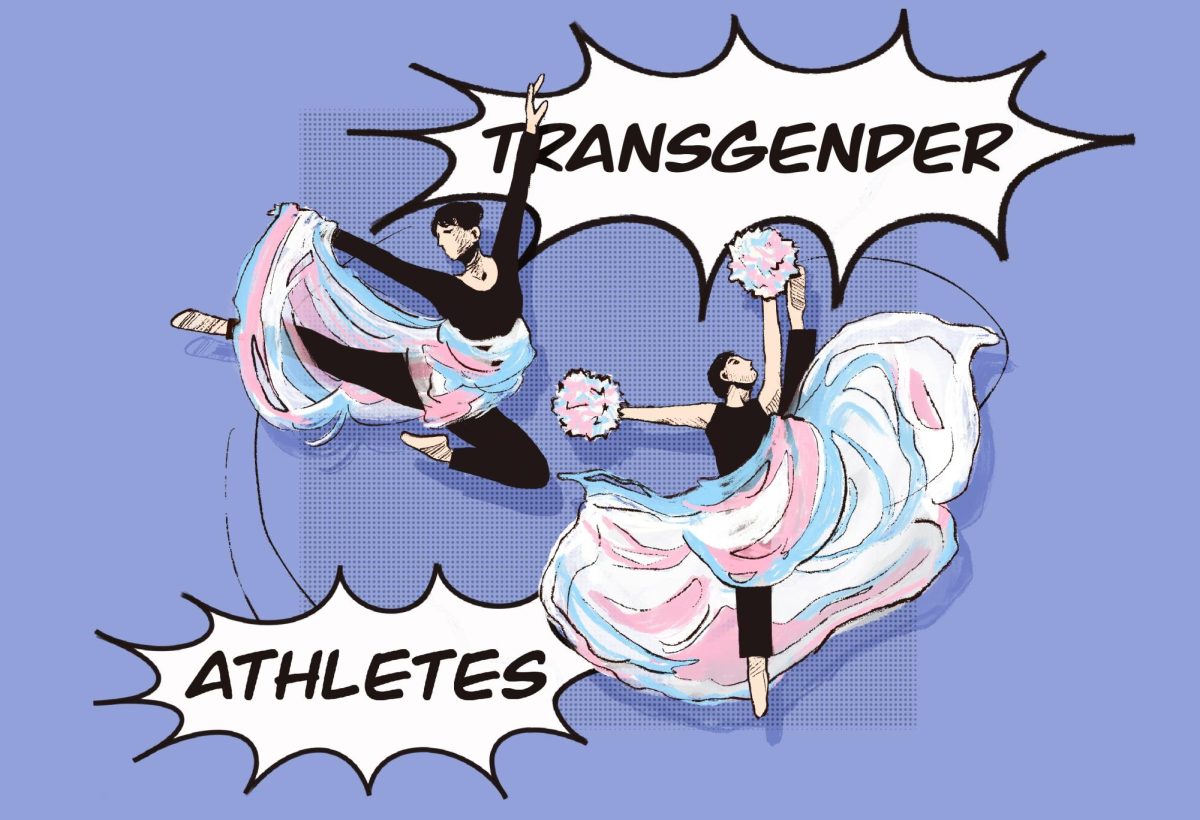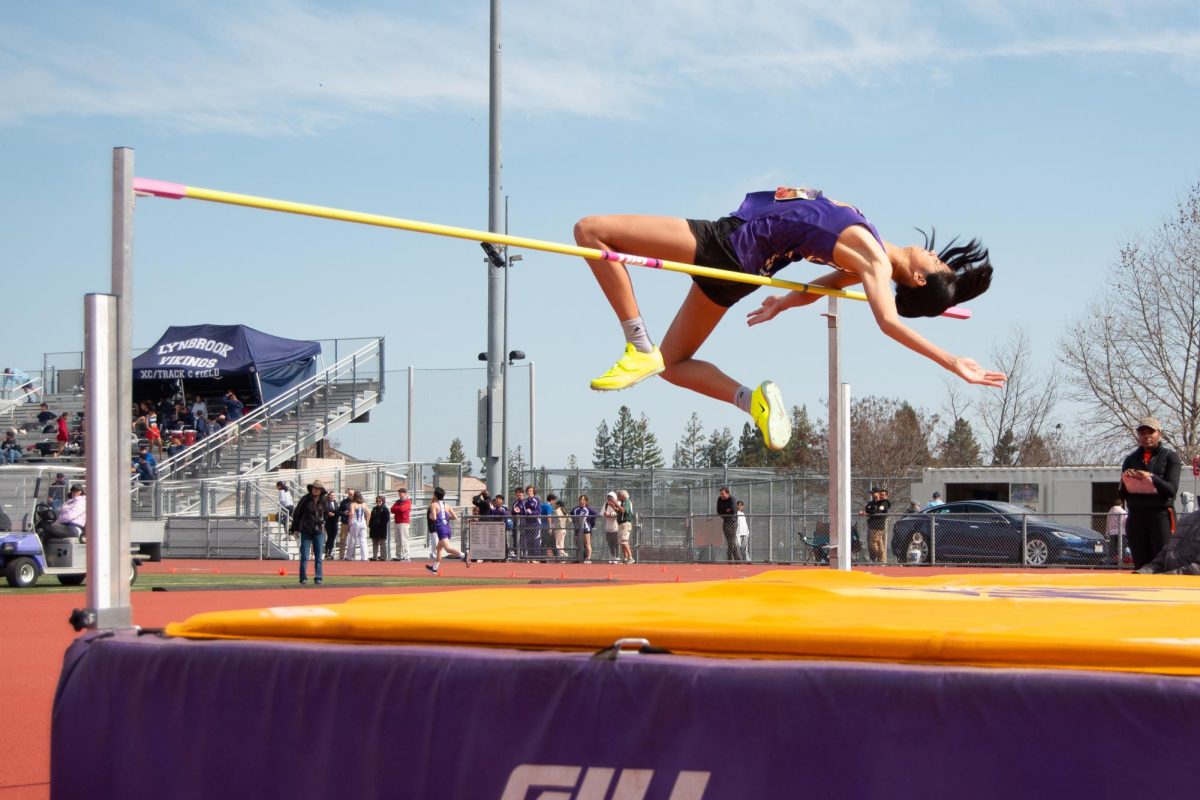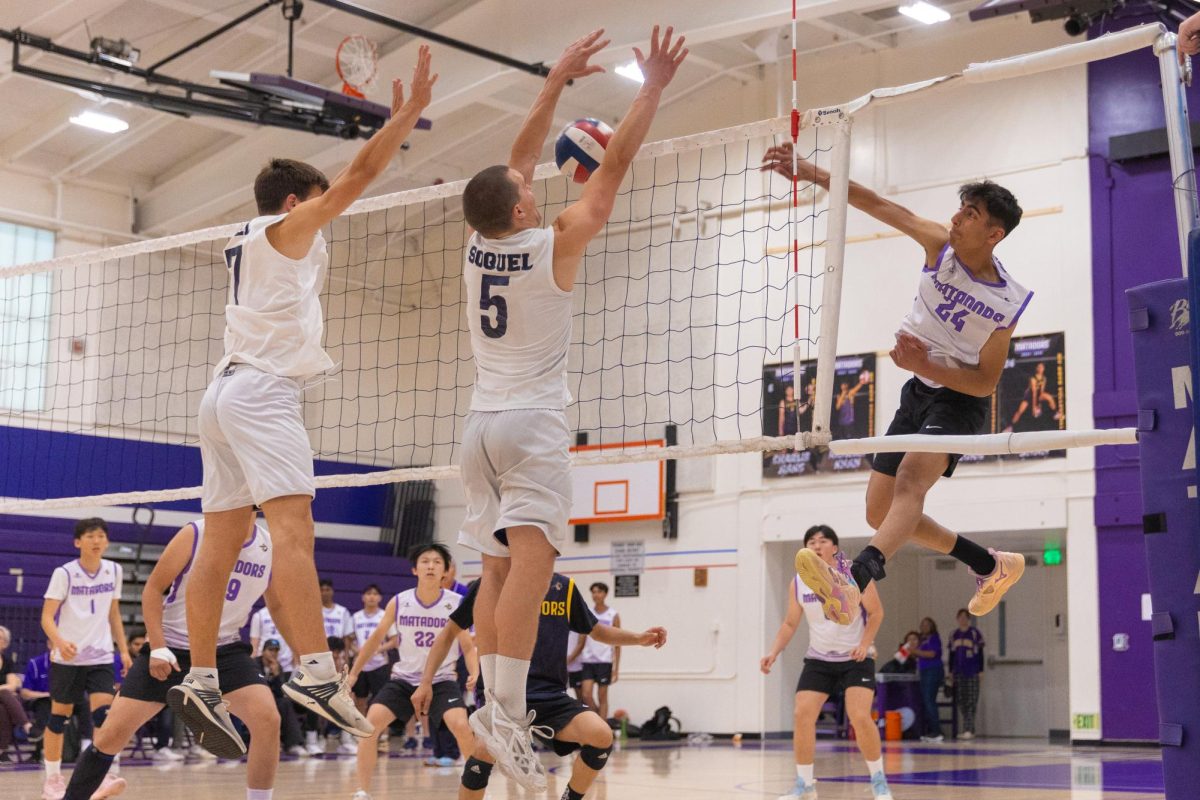Student A will remain anonymous due to privacy concerns.
At the end of their first season in their co-ed sport, Student A delivered a thank-you note to each and every one of their teammates. However, to Student A, these slips of paper meant more than a simple thank-you, because at the end of every note, they signed the message with their new name and pronouns. That was the moment they stepped out of the closet, coming out to each of their teammates individually.
Thinking the subtle signature was specific to their note, Student A’s teammates did their best not to out them to each other, not realizing Student A had actually come out to everyone. While reflecting on this experience, Student A feels grateful that their teammates had their back.
TRANSGENDER ATHLETES’ PARTICIPATION IN MVHS AND CALIFORNIA ATHLETICS
At MVHS, only a handful of teams — cheer, color guard, dance, football and marching band — allow students of any gender identity to freely compete. Most sports are separated into different teams, and some are exclusive to students of a specific gender, such as field hockey and softball, which only allow girls to join, and baseball, which only allows boys to join.
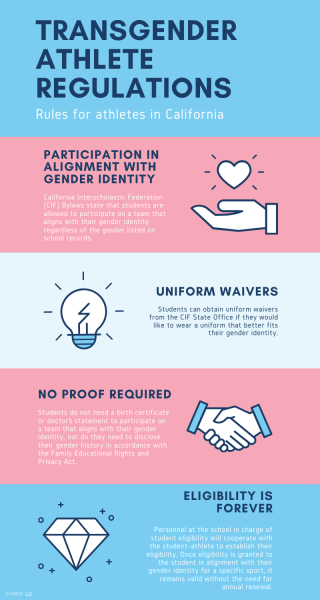
MVHS Athletics is part of the California Interscholastic Federation (CIF), which safeguards transgender athletes through a set of anti-discrimination rules. The CIF constitution bylaws state that “all students should have the opportunity to participate in CIF activities in a manner that is consistent with their gender identity.” According to Football Head Coach Ceazar Agront, MVHS has no policy that bars transgender students from participating on the team aligning with their gender identity, in accordance with the CIF. However, Agront says few MVHS students have actually transitioned and switched to a new team.
“Right now, if you are a biological male, and there’s this male sport, and you want to play that sport and that’s it, that’s your go to,” Agront said. “You don’t see [transgender women] coming down to go play softball. You are now starting to see a little bit more [transgender men] wanting to play baseball — you see that a little bit, but it’s not this open policy that’s being pushed, so you have people feeling timid and they might not want to take that chance.”
Despite the athletics program’s theoretical accessibility to transgender athletes, senior Naomi Mhamunkar believes transgender athletes could face hostility or ostracism from their peers for participating on the team aligning with their identity.
“Trans men [could] have to deal with the aggression of men not seeing them as real men,” Mhamunkar said. “Then there’s [a] language barrier and code switching that has to occur there. It’s an issue of the stereotype of [needing] more testosterone for better muscle mass things, and for example, locker room talk — there’s a lot of sexual harassment [that] goes on [in] those boys locker rooms, so being a trans man in [that] environment would not be [ideal for] mental or physical health.”
In an attempt to promote inclusivity and awareness, CIF has published its process for onboarding transgender athletes in its Gender Diversity Toolkit, which was created in collaboration with Gender Diversity. The toolkit includes guidelines for handling changes like uniform or locker room requests and recommends athletes to create a support plan with trusted individuals such as their parents or guardians, principal, counselors, or coaches.
THE EXPERIENCES OF TRANSGENDER ATHLETES AT MVHS
As a transgender athlete in Varsity Cheer, a co-ed sport, Mhamunkar felt grateful that she could continue participating on her team without feeling out of place after she transitioned — all she had to do was tell her coach and get a new uniform. While being transgender has posed a fair share of difficulties outside of cheer, Mhamunkar says her team has supported her and used her correct pronouns throughout her transition.
Student A also came out while on their team but remained closeted during their first season, as they realized they were transgender the same week they introduced themselves to the team. During that season, they recall feeling uncomfortable when the former director assigned them a uniform based on assumptions about their gender.
“Then I came out [and] everyone was cool with it,” Student A said. “But I was also really confused — I thought I was still gender neutral non-binary, so I didn’t know that I was [transgender]. There was that aspect of figuring that out while I was in my sport, so it was [an] active transition throughout the whole thing.”
In order to foster a welcoming environment, Agront makes it clear to his team that he will accept athletes of different genders and sexual orientations and call team members by their chosen name. Throughout his coaching career, Agront has always held onto one philosophy: if the athlete is good with it, he is too.
Student A sees their sport as a safe space for transgender athletes, as several other members on their team also identify as part of the LGBTQIA+ community.

“We try to make sure that everyone’s comfortable [because] the community has people [who] are associated with the [Gender Sexuality Alliance],” Student A said. “People know that [my sport] should be safe. Just blanket advice — ask for names and pronouns [and] if it’s okay to use those at home or if it’s only at school. Even though Monta Vista is pretty open to that, it’s still a problem, so it’s more of just normalizing that [and making] sure that people are respecting each other’s name and pronouns.”
Like Student A, Mhamunkar feels grateful that her teammates’ support has made Varsity Cheer a safe environment for queer and transgender athletes. Mhamunkar acknowledges that trust is an important and fundamental aspect of cheer, and her teammates’ support of her transition parallels the trust-centric aspect of the sport that encouraged her to join in the first place.
“I thought cheer was a very interesting sport because it’s all about being very supportive and caring towards others,” Mhamunkar said. “We’re lifting people into the air [so] we have to get our balance up [and] be very flexible just to be able to support ourselves and do stunts. It’s really something that you build your trust in, because you’re falling into the hands of someone else and hoping that they will be there to catch you.”
TRANSGENDER STUDENT ATHLETE LEGISLATION IN THE U.S.
At both the school and professional level, most sports are split into men’s and women’s teams. Mhamunkar finds that while having gender categories allows for two separate standards for athletes, it also causes a dilemma for those who identify outside of the binary.
“There’s no nonbinary [or] genderfluid sports section,” Mhamunkar said. “I think it’s really frustrating because there [might be] several athletes who are potentially trans men, but don’t want to be on a male team, or they’re nonbinary, and they don’t know if they want to go on the girls’ team or the boys’ team. It just puts them in an awkward position of [deciding] where they align with the best instead of where they truly are.”
Mhamunkar also points out that anti-transgender legislation in other states can enable prejudice against transgender athletes and deter them from playing sports on the team they identify with. While the CIF denounces discriminatory behavior against transgender athletes in California, over 23 other states have passed laws restricting transgender athletes’ abilities to play and compete in their preferred category since 2020.
“Lawmakers are so aggravated over something that doesn’t affect them in their personal lives,” Mhamunkar said. “For example, let’s say it’s middle school soccer — it’s not going to go on anyone’s transcript, so it doesn’t matter how much testosterone or muscle mass someone has because it’s just something for fun. I’d understand if they were calibrating for the Olympics or something else that has real metrics to it and is worldwide [or] national, but I think public schools [sports] should remain public to its students.”
Anti-transgender legislation often targets transgender girls, preventing students who were assigned male at birth from transitioning to join girls teams. Proponents of these bills — mainly Republican politicians — cite competitive fairness and unfair physical advantages as grounds for imposing these limits.
However, the CIF denounces such legislation in its Gender Diversity Toolkit, arguing that the presence of transgender girls on teams “has not been shown to diminish opportunities for others,” as advantages due to factors like physicality and quality of training are inevitable in sports. Following the influx of restrictive bills in certain states, prominent female athletes have also voiced their support for transgender women participation in school-level and professional-level sports.
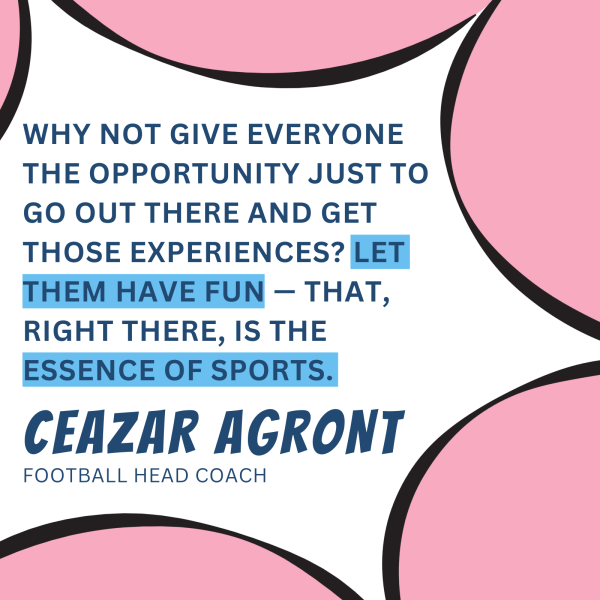
Agront personally strives to accept athletes of any gender identity and has coached transgender athletes on the football team in the past. Agront acknowledges that his ideal policy, in which students can freely play on the team matching their gender identity, might be utopian. However, he says public schools in particular should take a pro-transgender athlete approach.
“99% of the population is not going to go to the [professional sports] level and even higher than that, so why not give everyone the opportunity just to go out there and have fun and get those experiences?” Agront said. “Let them have fun — that, right there, is the essence of sports.”
Agront stresses the importance of considering the athlete’s ability and personality, rather than their identity, to determine if they are suitable for his team. He ultimately hopes to support students regardless of their identity, both as a coach and as a paraeducator at MVHS.
“Not [being] treated differently is such a satisfying achievement, when you’re able to walk into whatever you’re doing,” Agront said. “You may internally identify [a certain way], even externally — you may dress a certain way or look a certain way — and just to be accepted and not be looked at differently is huge..It’s just who you are, [if] you’re a good person. That’s [the] accepting factor.”







